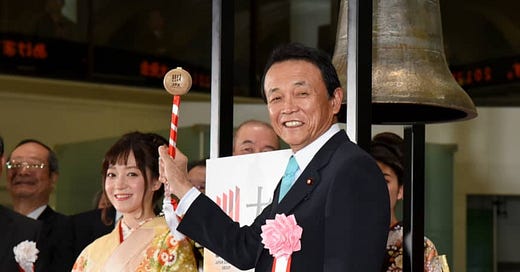How Different is China from Japan towards Blockchain & Crypto
Blockchain & Crypto Asia #1 Japan and China have a different attitude towards blockchain and cryptocurrency
Japan is one of the most important cryptocurrency markets in the world. Some people estimate that about 50% of the total circulating bitcoins are in wallets located in Japan.
One of the reasons Japan is experiencing the boom is that Japanese regulators take an aggressive approach to support the growth of this new technology.
Photo credit: The Japan Times
On Sept. 5, 2019, Japan's Deputy Prime Minister and Minister of Finance Taro Aso spoke at the FINSUM Fintech conference in Tokyo. Aso stated that regulations need to be adapted to keep up with new and emerging technologies and that financial authorities must respond quickly to new developments in order to avoid getting left behind. Aso added, “New approaches are important without relying on conventional frameworks and approaches.”
How refreshing and encouraging!
One thing we have to keep in mind. Different from the U.S., where institutions play a more active role in adopting cryptocurrency, Japan is a retail-driven market, where institutions are slow and reluctant to dip their toes into crypto trading.
Japan's neighbor China takes a don't-want-to-deal-with-it attitude towards cryptocurrency. In 2017, Chinese regulators cracked down on cryptocurrency trading, driving a good number of exchanges out of the country, which take refuge in foreign countries, including Japan and Korea. As a result, China lost its once-the-highest-in-the-world trading volume. Chinese exchanges keep their marketing and customer service operations in China. Meanwhile, it is believed that, after the crackdown in 2017, there are still thousands of underground exchanges active in China offering trading services to retail investors.
When chatting with some underground exchange operators last September at a blockchain conference in Shanghai, they said that Chinese regulators were fully aware of the situation. Promotions and discussions about the trade are mostly supported via WeChat, one of China's most popular messaging platforms, which is closely monitored by the government. They estimated that sometime in 2020 the government was going to make another attempt to root out illegal exchanges, causing another wave of the exodus of exchanges.
The regulator, however, took action earlier than that. In late 2019, Beijing, Shanghai, and Shenzhen cities published official announcements to ban crypto trading and raided some exchanges’ offices.
At the same time, China is aggressively pushing for the adoption of B2B blockchain technology. On October 24, 2019, Xi Jinping, in his speech to the Central Politburo of CPC, endorsed blockchain technology and emphasized its importance to China’s economic and social development. People from the industry, therefore, expect the adoption of blockchain technology by institutions will accelerate in China.
Chinese big four banks have reported application cases of blockchain:
China Construction Bank is upgrading its BCTrade, a blockchain-based platform offering factoring and forfeiting services that enable exporters to get immediate cash by selling their medium and long-term receivables at a discount price. Launched in April 2018 it has processed more than $50 billion in transactions to date.
ICBC, the largest bank in the world by assets, has also created a blockchain platform of financing to help SMEs with factoring transactions. It has processed over $6.4 billion in transactions in the first nine months since its launch last February.
Bank of China facilitated its first cross-border money transfer to South Korea in dollars via its patented blockchain payment system last August.
We should also keep an eye on the Bay Area Trade Finance Blockchain Platform launched last September by China's central bank to help SMEs with financing in the areas between Hong Kong, Macau and Guangdong province in southern China. The Bay Area is modeled after the Bay Area in San Francisco and New York to create a financial and technological development zone by connecting Guangdong Province, Macau and Hong Kong.
Photo credit: China Daily
Japan and China take different approaches toward blockchain and cryptocurrency. The former encourages its retail investors to invest in cryptocurrency within a regulated climate, while the latter is more committed to the underlying technology - blockchain while considering crypto trading a threat to social and financial stability.
—————-
About the author
In the innovative blockchain, crypto & digital asset ecosystem, Asia is the other side of the coin. Blockchain & Crypto Asia, which covers exclusively blockchain and crypto & digital asset developments in Asia, including regulation, investments, and company highlights, helps you stay on top of what is going on in the Far East. The curated content is selective and serves as information, and personal views only, not investment advice.
I am the co-founder of Kee Global Advisors. Please email me with any ideas or thoughts. I’d love to hear from you! You can also follow me on Linkedin and Twitter.






